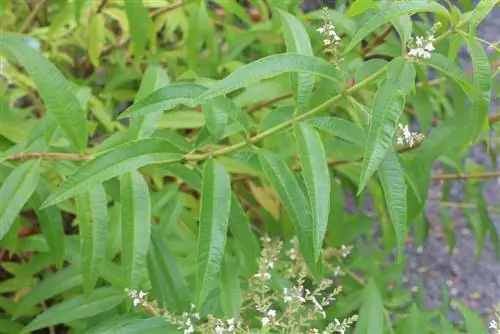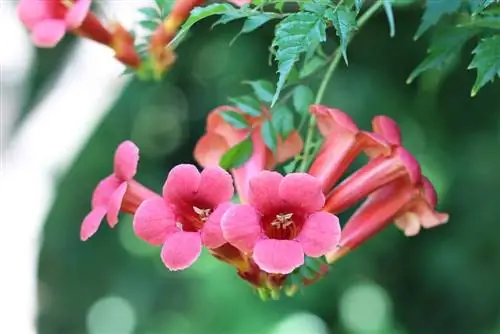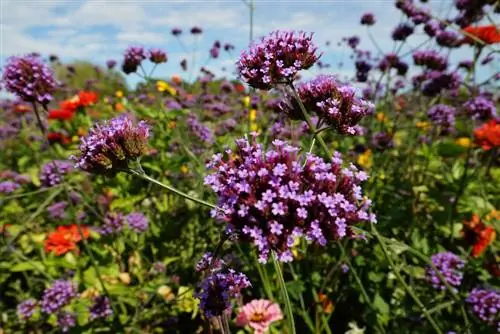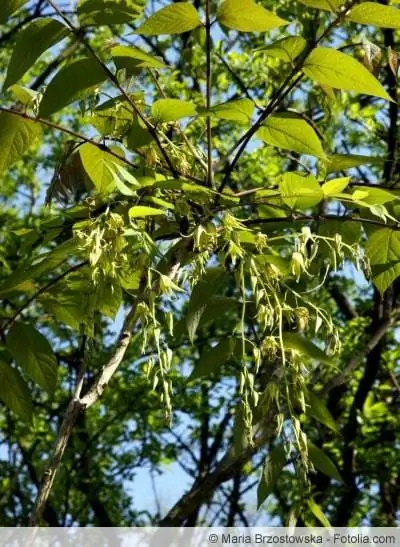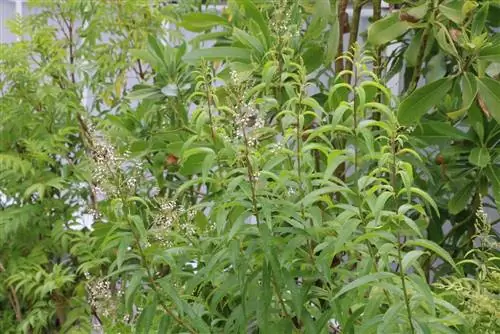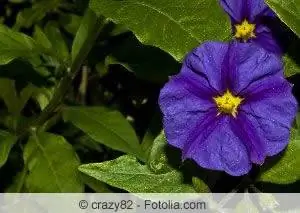- Author admin caroline@plants-knowledge.com.
- Public 2023-12-17 03:39.
- Last modified 2025-06-01 06:48.
Even the name lemon verbena melts in your mouth. There simply has to be a very special plant hidden behind it. And in fact the South American lemon bush is unique in the local herb landscape. The intense citrus scent is its greatest trump card. A small touch is enough and it flows towards us. How can the herb survive the European winter he althily despite its strong aversion to frost?
When does it get uncomfortable?
The lemon verbena, bot. Aloysia citrodora is Chilean in origin. In its homeland and in neighboring countries it greens areas with a mild climate. Weather-wise, it didn't do so well for us. In addition, their ability to adapt quickly reaches insurmountable limits. It gets uncomfortable for her below 10 degrees Celsius, but she holds on bravely. But when temperatures fall below -4 degrees Celsius, they can no longer bear to be outside. Even after years of cultivation, winter hardiness is and remains a foreign word in this country.
Winter is coming, what to do?
Due to its lack of winter hardiness, the verbena is usually assigned a mobile home from the outset. Pots can be quickly moved outdoors and just as quickly into winter quarters. However, some specimens grow directly in the herb bed, where they can reach a considerable size. When the footsteps of winter can already be heard, the gardener's attention is needed. The right time for the move must be decided. A fixed calendar date is not necessary. The lemon bush can still take in the last rays of sunshine. As long as it stays above 12 degrees Celsius, he can stay outside. The plant survives unexpected, light frost nights unscathed, but should then be moved into the house at the latest.
Acceptable winter quarters
Green plants live from light and therefore belong outdoors. A closed room is always the second choice. But many plants from distant countries are not designed for our climate. Since no one wants to do without them, a winter quarters regularly acts as an extension of the garden. For the verbena it must have the correct key data:
- Room temperature must not fall below - 2 degrees Celsius
- temperatures between 10 and 16 degrees Celsius are optimal
- the room should be dark
- the colder, the darker
- Do not expose under any circumstances to direct sunlight
- high humidity is beneficial
Note:
In very dark areas, the verbena quickly throws its leaves to the ground. This is no cause for alarm. The “bare” stems are covered with new leaves by May of the following year at the latest.
Lemon bush has to leave the bed
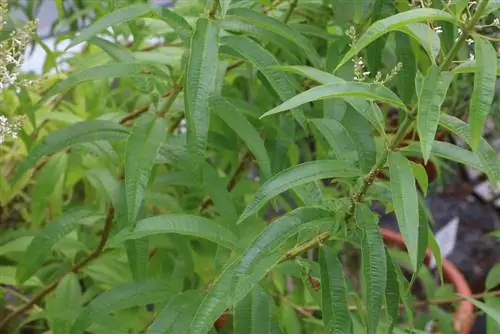
A lemon bush that was planted out over the summer does not get any fresh air extension in late autumn. Instead, it has to pull in its roots and hop into a bucket. The bucket is a must, because overwintering with only bare roots is not good for the shrub. A protective layer of earth must always surround it. The further procedure is the same as for pure pot cultures.
Cutting is required before moving
Old pot-dwellers and new pot-dwellers alike have to leave some of their shoots outside before moving into the winter rooms.
- grab the scissors before the frost
- shorten all shoots without exception
- at least three quarters of the length has to go
After cutting, the pots are placed in their place, which will serve as their new home for the next few months. If the room is large enough, the individual plants should not touch each other.
The thirst for water is modest
The plant mass decreased significantly after cutting and with it the evaporation area. The water-consuming growth has also come to a complete standstill. This all has an influence on the winter water balance of the verbena.
- only water now and then
- the earth should never dry out completely
- only increase watering in spring
Note:
Use stale water for watering. It shouldn't be too cold or too warm. Ideally it is at room temperature.
No growth, no nutrient requirement
In winter, fertilizer is completely unnecessary because the verbena does not need any nutrients. The last supply of nutrients should not take place later than August anyway. Fertilizing should only start again at the beginning of the new vegetation phase.
- there is a growth break from September to March inclusive
- then don’t fertilize at all
You can wait until you move outside to fertilize. It is also conceivable to add a small amount of fertilizer shortly before the end of the wintering phase.
The leaves say goodbye
Verbene almost always sheds its leaves due to lack of light. Sometimes already outside, but usually only in their winter quarters. Collect the fallen leaves in good time as they encourage the spread of rot.
Tip:
Fallen leaves belong in the trash. However, if you collected and dried fresh leaves in the summer, you can now warm yourself up with a delicious verbena tea.
The sun is calling again
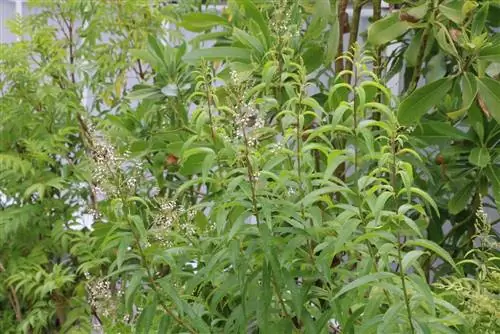
In most winter quarters, space is at a premium. The pots are close together. This cramped dwelling should be evacuated as quickly as possible. Even the first warm days of the year are tempting for the verbena. But the trip out into the fresh air should not be rushed. The weather is not stable, there may still be many frosty nights ahead.
- Verbene can go out when temperatures climb above 12 degrees
- Only put out during the day until mid-May
- get used to the sun slowly
- water a little more
- start fertilizing in April
Spring pruning for he althy growth
The winter quarters offer reliable protection from the bitter cold and icy winds. But only very few plants emerge completely intact from the overwintering period. The privations have visibly taken a toll on plant he alth.
- some shoots don't survive the winter
- grab the scissors again
- remove dried and damaged shoots
- he althy shoots will soon follow
Outside, only if necessary
It is said that individual plants actually survived the winter outdoors in our latitudes. This is good news for everyone who loves the lemon bush and cannot provide it with suitable accommodation. The more general conditions are right, the greater their chances of survival.
- the verbena starts the cold season he althy and strong
- hopefully the winter is mild
- your location should be protected
- Short verbena heavily in autumn
- a high cover of leaves provides warmth
It will only be seen in spring whether the verbena can spread its citrus scent again.

